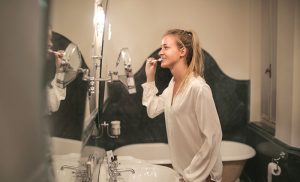You can’t deny the attractiveness of a pearly white smile. It’s what celebrities pay big money for. It’s what we see all over Instagram. It’s the goal when anyone is trying to enhance their smile, and it’s the ultimate cherry on top of straight teeth. We can all agree that white teeth are just better. It enhances one’s beauty and takes a smile to the next level.
The problem is that many of us are avid coffee or wine drinkers, which can stain our teeth. But wait, many Hollywood stars can’t live without their daily coffee, so how do their teeth stay so white? We’ll tell you this much: they’re not resorting to quick-fix stain treatments.

(Andrea Piacquadio / pexels)
Teeth whitening should always be done by a dentist, whether it’s a treatment in the dental chair, a professional at-home kit given to you by your dentist, or a mixture of both. Here’s what you need to know about common DIY teeth whitening treatments.
Whitening Strips
Whitening strips are trendy, especially for a quick whitening before a special occasion. They are convenient because they can be bought at your local supermarket and are relatively affordable. They are also appealing because they can be worn around the house while doing housework or writing emails.
Risks of Whitening Strips: Dental strips are OK in moderation. The risk comes from overuse. Most dentists recommend only using whitening strips once a year. Overuse can cause damage to your gums and enamel, as well as intense sensitivity to your teeth. Many users disregard the recommendations and use the strips weekly or even daily, but this can backfire. With overuse, every sip of cold water and every bite of ice cream can send chills down your spine. Please don’t overdo it! There’s also the cosmetic risk of uneven coloring as the whitening strips don’t get between teeth.
Whitening Gum
This one is quite interesting. Whitening gum claims to whiten your teeth with every chew. Typical whitening gum contains mild abrasives meant to treat present stains on your teeth and prevent new stains. The gum is harmless with no known side effects. However, you’ve got to chew A LOT of gum to make a significant impact. But if you like the gum and would typically spend a lot of money on gum anyway, then why not get some whiter teeth in the process?
Over-the-Counter UV Kits
Over-the-counter UV kits use various waveforms of light to whiten the teeth. The kit will use either ultraviolet light (UV), Light Emitting Diode, or LED. UV light is a type of magnetic radiation that uses heat to help the process. A kit that uses either LED or UV light might also use hydrogen peroxide to accelerate the teeth whitening process.
Risks of Over the Counter UV Kits: Possible damage to the soft tissues and teeth, gum irritation, tooth sensitivity, and bleach spots.
Whitening Pens
Whitening pens are designed for spot treatment. They treat small areas or individual teeth that have stains or isolated discoloring. The pens contain a mild concentration of hydrogen peroxide. Because of the low concentration, the process is very, very gradual.
Risks of Whitening Pens: Overuse can cause tooth sensitivity and gum irritation, and you may not even notice a difference for several months, if ever.
Home Remedies
You might find some commonly used teeth whitening ingredients in your kitchen or bathroom cabinet. Some common home remedies for teeth whitening include:
-
Activated charcoal
Activated charcoal has become a popular remedy for teeth whitening. Many users claim that powdered activated charcoal removes stains and brightens teeth. There are many charcoal toothpastes on the market. However, charcoal toothpaste can be abrasive and wear down the enamel of the teeth.
-
Turmeric
Turmeric is another fad for teeth whitening. Many beauty bloggers swear by its healing properties that whiten your teeth. The science behind it is limited, and it has potential to stain your teeth.
The safest way to whiten teeth
There is nothing wrong with whitening your teeth for a show-stopping smile! We just want you to know all the facts before choosing how to achieve that brighter smile. Use DIY treatments with caution and be wary of overuse.
Your dentist can talk to you about in-office teeth whitening treatments or provide at-home trays so you can whiten your teeth in the comfort of your own home. The best part about professional whitening treatments is that they are tailored to your specific needs without damaging your enamel. The bottom line is that professional treatments are safer and more effective than DIY treatments.
If you’re interested in teeth whitening or any other cosmetic dentistry in Layton or West Haven, get in touch with us. We’d love to help make your teeth whiter and brighter!
